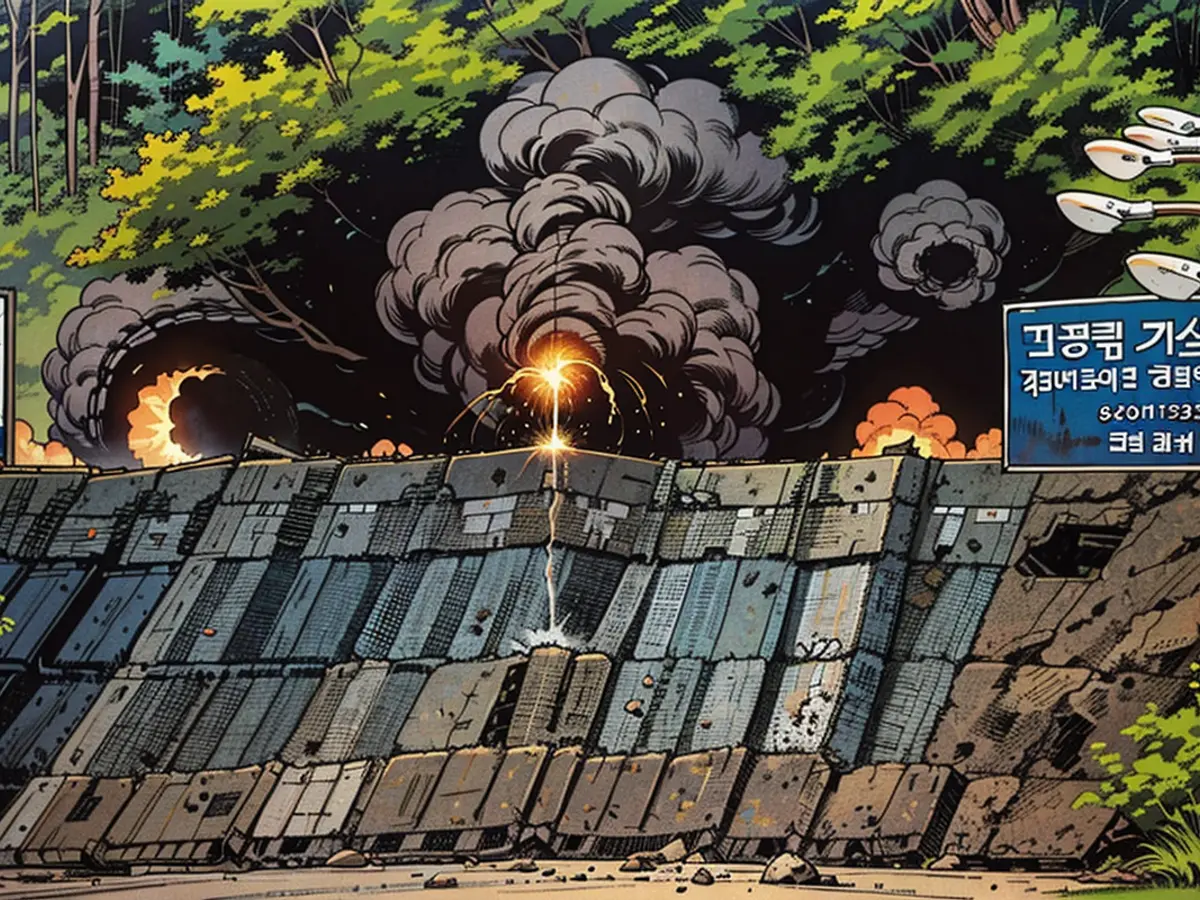North Korea destroys infrastructure along its border with the South following its announcement of completely severing relations.
Around noon local Korean time, parts of the Gyeongui line on the western coast and Donghae line on the eastern coast, major links for travel between North and South Korea, were damaged via explosions, as per Seoul's Joint Chiefs of Staff (JCS).
In essence, this destruction has minimal impact on the division between the two Koreas, as the borders are heavily fortified and these routes had been inactive for years. However, the symbolism behind this act is of significance, given the heated exchanges between the two leaders.
A video shared by South Korea's Defense Ministry showed several blasts on the northern portion of the demarcation line, which divides the two Koreas. Subsequently, heavy machinery such as trucks and excavators were employed to clear the debris from at least one of the damaged roads, according to the video. The JCS mentioned that the North was continuing its operations with the machinery, without providing further details.
In response, the South Korean military discharged artillery within its designated area south of the military demarcation line. It also maintained vigilance and preparedness, working in cooperation with the US, according to the JCS.
South Korean Defense Ministry released footage showing explosions along the northern side of the military demarcation line separating the two Koreas. Earlier in the week, South Korea alerted of potential demolition of roads linking the two nations, warning that the explosions could occur shortly. Consequently, the Defense Ministry implemented contingency measures, albeit not disclosing specific details.
A JCS spokesman reported detecting people working behind barriers installed on the North's side of the border.
The explosions occurred shortly after North Korea accused South Korea of deploying propaganda-filled drones over Pyongyang and vowed retaliation. This was in response to months of North Korea's action of dispersing trash-filled balloons towards the South.
Last week, North Korea's military threatened to separate its territory from South Korea entirely, following North Korean leader Kim Jong Un abandoning the policy of peaceful reunification with the South earlier in the year.
North and South Korea have remained separated since the end of the Korean War in 1953, resulting from an armistice agreement. The two nations were technically still at war but both had aspired to reunify at some point.
In January, Kim declared that North Korea would no longer pursue reconciliation and reunification with South Korea, referring to the relationship between both nations as "a relationship between two hostile countries and two belligerents at war," according to KCNA.
Severe military situation
On October 9, the general staff of the Korean People's Army (KPA) announced through state-run news agency KCNA that they would completely close down the remaining roads and railways linking to the South, blocking any access to the border.
They argued that the tense military situation prevailing on the Korean peninsula called for the North Korean armed forces to undertake resolute and bolder measures to protect the national security.
The measures served as retaliation to recent military exercises held in South Korea and visits by alleged US strategic nuclear assets in the region, according to the general staff. In the past year, a US aircraft carrier, amphibious assault ships, long-range bombers, and submarines have visited South Korea, resulting in harsh condemnations from Pyongyang.
Since January, Pyongyang has reinforced its border defenses, laying landmines, constructing anti-tank traps, and dismantling railway infrastructure, as reported by the South Korean military.
The leaders of North and South Korea have also escalated the use of aggressive rhetoric.
Earlier this month, Kim threatened to use nuclear weapons to annihilate South Korea if attacked, after the South Korean president warned that if North Korea utilized nuclear weapons, it would face the end of its regime.
These threats come as North Korea appears to have intensified its nuclear production efforts and strengthened ties with Russia, causing widespread unease and concern in the international community.
Leif-Eric Easley, a professor at Ewha Womans University in Seoul, posited that North Korea's decision to cut off its territory from the South could be a means for Kim to shift blame for his nation's economic struggles and legitimize his investment in missiles and nuclear weapons by exaggerating external threats.
He suggested that Kim Jong Un might be motivated by political instability, rather than military strength. "North Korea's threats, both real and rhetorical, reflect the regime's survival strategy of a hereditary dictatorship," Easley said.
The destructive actions in Asia, specifically on the Gyeongui and Donghae lines, while causing minimal physical separation between North and South Korea, hold deep symbolic meaning due to the ongoing tensions between the two leaders. The escalating military situation on the Korean peninsula has led North Korea to threaten to completely seal off its borders, including the remaining roads and railways linking to the South.







